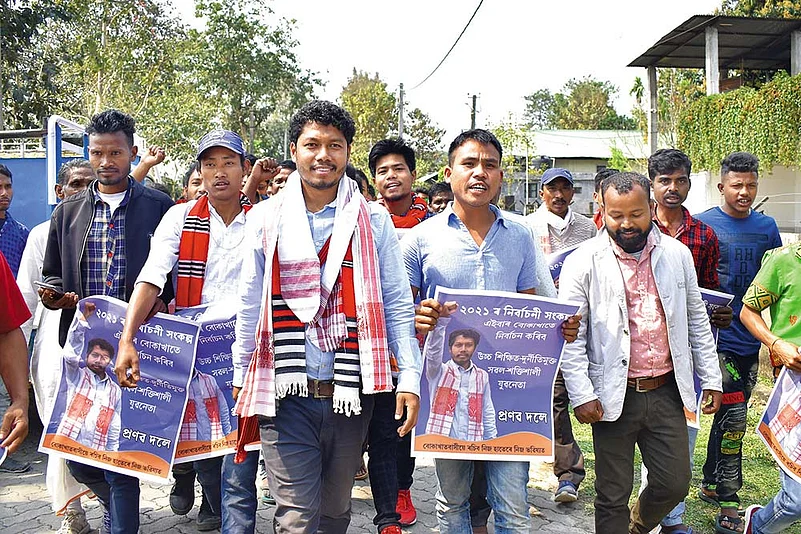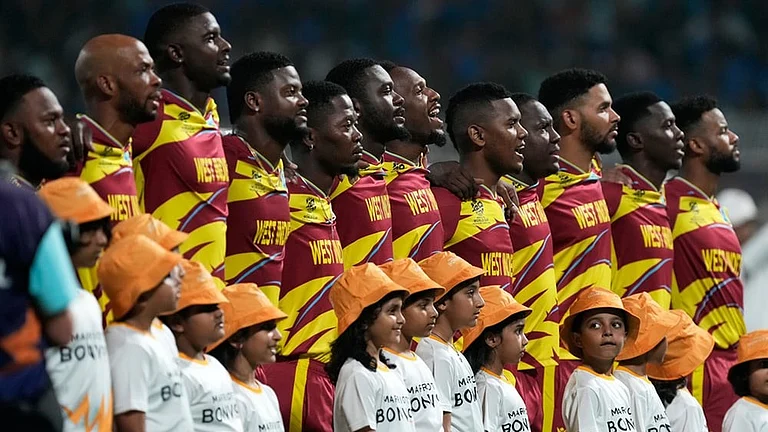Light green, purple and yellow spring foliage provided a surreal backdrop as a rhino grazed in the swamp, her infant pottering about close behind, turning back now and then to charge at a trailing pond heron. Childish impishness a rhino calf can afford. Two elephants, a small rangale of hog deer and a couple of wild buffaloes laze under the March sun. The picture of arcadia is a wide-angle shot—a panoptic view of Assam’s Kaziranga National Park. The tranquility is but just a facade, hiding existential realities in a land where man and animal struggle to co-exist, and often face-off, sometimes with tragic consequences.
Pranab Doley grew up amidst this daily battle of his people—the Mishing tribe, an ethnic group living by the Brahmaputra and its tributaries since time began in this part of the world. Battered every year by floods and erosion, in conflict with wild animals wandering out of the park in search of food and shelter, and a system which, he says, advocates a “capitalist model of development” with no concern for the very people who have nurtured nature for millennia. Doley, 35, has now picked the biggest battle of his life. He will contest as an independent candidate for Bokakhat in the assembly polls. The constituency straddles the park, a Unesco World Heritage site. Voting is on March 27 and his main rival, MLA Atul Bora of the Asom Gana Parishad (AGP), is an ally of the BJP.
ALSO READ: The Third Dimension
Doley is among the fresh faces contesting the 2021 polls—as independents or hitching a ride with smaller parties. All of them are self-avowedly fighting against the ruling dispensation’s allegedly authoritarian regime that allows no quarter to dissent. The battle, they say, is for “Assamese nationalism” as against the BJP’s all-encompassing, pan-India nationalism. And at the heart of their poll strategy is the contentious Citizenship (Amendment) Act, which fast-tracks Indian citizenship to persecuted non-Muslims from three neighbouring countries. The passage of CAA in 2019 had sparked large-scale, and violent, protests in the state. Five people were killed in police firing.
Though the ruling BJP-led alliance insists that CAA is no longer an issue in Assam—a point consistently driven home by BJP strongman Himanta Biswa Sarma—the two new parties, Raijor Dal and Asom Jatiya Parishad, are seeking votes precisely on this legislation, which they describe as the biggest threat to the identity and existence of Assam, and the Assamese.

Pranab Doley campaign for the forthcoming assembly polls in Assam.
More than 200 km east of Bokakhat, in the oil town of Duliajan, Lurinjyoti Gogoi, a former leader of the All Assam Students’ Union (AASU), is in the fray as a candidate of the Asom Jatiya Parishad he floated last year. Jailed farmers’ leader Akhil Gogoi is a Raijor Dol candidate too—for Sivasagar, a town whose storied history dates back several hundred years, when the Ahom kings ruled Assam from there, uninterrupted for six centuries.
ALSO READ: Fang Shui: The Martial Art Of Mithunda
The three-phase elections in Assam—March 27, April 1 and 6—are largely expected to be between the BJP-led alliance and the Congress-led coalition of eight parties that include the AIUDF of MP and perfume baron Badaruddin Ajmal. Though the Congress is backing candidates of smaller parties and even Doley in its bid to spoil the BJP’s advantage, the ruling alliance says it will win 100-plus seats in the 126-member assembly. Lurinjyoti, for one, says the emergence of two new parties—and contesting jointly—has unnerved the BJP. He even accuses BJP workers of being involved in a recent attack on his convoy, a charge denied by the ruling party. The ruling alliance believes a split in non-BJP votes will undo the Opposition.
A split, already? Ideological, yes. Akhil Gogoi has derided the Congress for tying up with the “communal” AIUDF. In a letter to political parties, Gogoi said: “We think the BJP and AIUDF are two sides of the same coin. If we take them along with us, we will be weakened ethically, ideologically and politically.” In contrast, Doley is focused solely on what he terms “local issues”. Doley, who studied at Viswa Bharati and TISS Mumbai, says his decision to contest springs from the injustice people faced under the current government, which he described as “fascist”. “Since time immemorial, the Mishings and Adivasis have been the true custodians of the forest and its resources. But when it comes to the official idea of conservation in Kaziranga, we are never in the picture. With every expansion of the park’s area, our people are evicted and left with no home or hearth,” he says.
The Mishings and Adivasis—mainly tea garden workers—constitute about 1 lakh of the constituency’s 1.4 lakh voters. “We also face the ravages of flood and erosion every year, forced to move houses frequently. But the government’s development schemes bypass us always. This election is about taking control of our own destiny,” says Doley, a wiry young man with a mop of wavy hair and straggly beard. “Ours is a battle for our rights. The government says the expansion of Kaziranga for better conservation, but all we see are more and more concrete tourist resorts. Some of them have even two swimming pools, while our people cry for a drop of drinking water.” There’s anger in his voice. “We have been advocating scientific conservation for years wherein the people who live on the fringes of the park get access to forest resources. We know how to live in harmony with nature. We will cut branches for firewood, but not the tree. When a new resort come, huge patches of forests are cleared by felling all the trees.” There’s dejection in his voice.
Last year, the government approved addition of more than 30 square km to the park, increasing its area to 915 square km. Ever since the home of the one-horned rhino—besides several other species, including tigers—was declared a national park in 1974, land acquisition has been a contentious issue. Doley himself has led several protests against land acquisition. He says people living on the park’s fringes are harassed, even arrested, every time poachers kill a wild animal and authorities fail to catch the real culprits.
In an election described by Himanta Biswa Sarma as a “clash of civilisations”—mainly referring to Ajmal’s AIUDF—the new faces are providing an alternative perspective to the voters. Their impact is in the realm of speculation of amateur vote-gazers and calculative pundits. For many, they are the dissenting voices needed to make the ruling dispensation shake off its inertia. “The BJP needs to know that it has to work to earn our votes. I can’t say who will win, but if the BJP does, it will at least know that the people have other choices,” says Raktim Baruah, a shopkeeper in Nagaon. For Akhil or Lurinjyoti, that is the big takeaway from Election 2021.
By Anupam Bordoloi in Guwahati





















